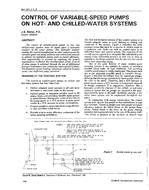Computational fluid dynamics (CFD) can be a very useful tool to help designers evaluate the indoor air quality and thermal comfort provided by HVAC systems. This paper describes how a CFD program is being used to guide the design process and optimize the ventilation system design for the world’s first indoor auto-racing facility. The facility is primarily a single space building with a floor area of over 2 x 106 ft2 (0.2 x 10 6 m2) and a ceiling height of 150 ft (46 m). The facility is being designed to accommodate a variety of future possible occupancy conditions for a wide variety of events–60,000 spectators in the grandstands and/or 60,000 spectators in the infield, as well as lesser occupancies within various areas of the infield. Of all the possible events anticipated for this unique facility, the design team selected a “worst case” condition based on the maximum possible occupant density during a racing event in which 45 race cars are running simultaneously on the track at speeds of up to 155 mph (250 km/h). The CFD results are being used to improve the base case–conventional ventilation system design, step by step, to an optimal design–combination of displacement ventilation and overhead duct system and partial air curtain system. The CFD results are much more informative and accurate than those that could be obtained manually or with other methods.
Units: Dual
Citation: Symposium Papers, Atlantic City, 2002
Product Details
- Published:
- 2002
- Number of Pages:
- 10
- File Size:
- 1 file , 720 KB
- Product Code(s):
- D-7031


